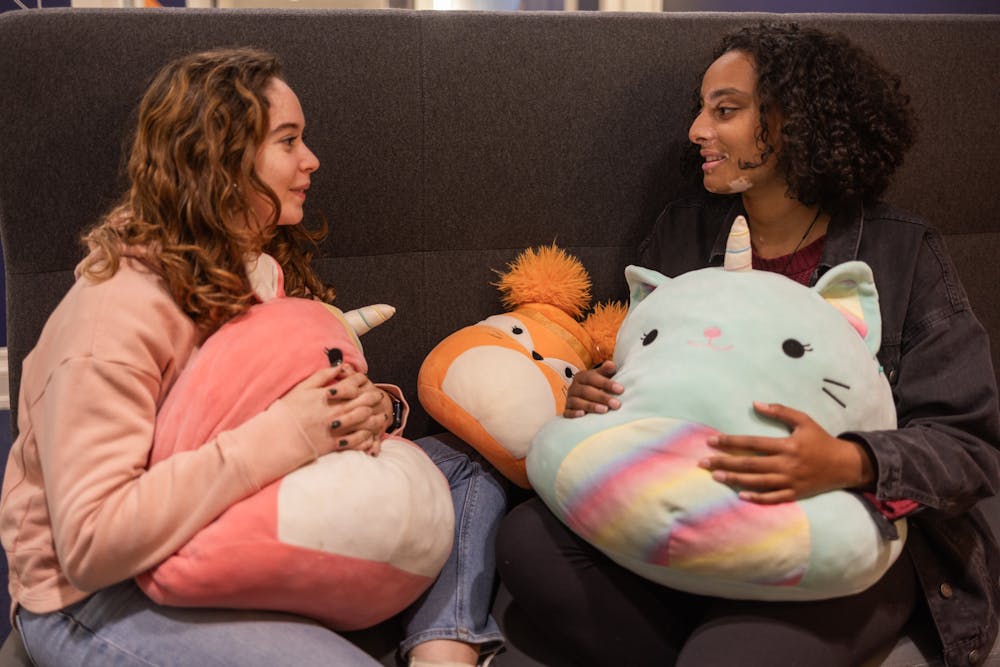Amidst the chaos of preparing for college move-in day — finding LED lights and posters for the walls, or making sure to bring the coveted mini-fridge microwave unit — some students haven’t forgotten to add their cherished stuffed animals to the list. These stuffed animals can help students feel more comfortable in their new college environment, acting as a uniquely portable piece of home.
For second-year College student Carly Cespedes, most of her stuffed animals have been gifts from other people and hold lots of sentimental value. According to Cespedes, bringing them to college felt like bringing a piece of her family and friends. Her stuffed animals foster an atmosphere of warmth and belonging in an otherwise sterile dorm room.
For her personally, the close contact with her stuffed animal Stevie — all her stuffed animals are named after music icons — is her coping mechanism in her moments dealing with stress-inducing situations of isolation, grief and anxiety.
“The way of having something physical grounds me in those moments of anxiety and homesickness,” Cespedes said.
Stuffed animals not only serve as soft companions but have been proven to provide greater mental health benefits. Studies show that cuddling and snuggling with stuffed animals actually help in lowering levels of stress and anxiety. Cespedes said that her stuffed animals do just that.
“Some of them are meant for anxiety,” Cespedes said. “So whenever I'm anxious, I have them there — they're supposed to help with that. And I do think they help.”
Second-year College student Maya Papadopoulous has a stuffed dinosaur named Matcha, who she got with a friend during high-school. Now, she uses Matcha as a pillow on her bed. Like some students, Papadopoulous notes that there is a certain gender stigma around using stuffed animals for comfort. She said it feels more socially acceptable for women to own stuffed animals as opposed to men, including herself. Her female friends, she said, tend to go out, purchase and collect them.
“I would say that [Matcha] has a little bit of sentimental value just because I bought it with some of my friends when I was in high school,” Papadopoulos said. “It's soft, comfortable… it does remind me of good memories and good times.”
Cespedes said that this also is true in her experiences, but has fond memories of even male friends who gravitate towards stuffed animals.
“I definitely have only ever really seen girls have stuffed animals,” Cespedes said. “But last year it was funny because one of my guy friends was obsessed with this stuffed animal that I had in my room and so he took it from my room and [to] his room all semester, so that was pretty cool to just see him not care about [it].”
Cespedes said that while she thinks no one would judge a college male student for owning stuffed animals, this stigma could potentially discourage them from seeking them out.
Second-year College student Andrew Otwell said that with less judgment people are starting to be more comfortable with owning stuffed animals. Though there might still be a gender-related stigma, stuffed animals are being enjoyed by individuals regardless of gender. Otwell recently bought his own stuffed animal and brought it with him to college last year.
“I don't think I'm in the minority,” Otwell said. “In the past as young teens, maybe [there was a gender stigma]. I feel like it has been getting better, though.”
Stuffed animals can often serve as a form of expressing affection through gift giving. Second-year College student Ritika Bawa reminisced on how one of her favorite stuffed animals — a teddy bear — was a Valentine’s Day gift from her parents. She said this gift felt like a physical affirmation of their love for her.
“I think it's so nice to know that, although you might not be dating someone or it was that sort of romantic way, you're loved by your parents,” Bawa said. “That’s probably the most sacred form of love, I think. So it's something that I really value for that core memory. ”
Although they may be initially designed for children, some students do not plan to depart from their fluffy companions any time soon. In a New York Times blog, it was revealed that a significant percentage of adults still sleep with a certain stuffed animal — nearly 40 percent.
“I feel like the older I get I'm trying to do more things that make me feel like a little kid again because we're all growing up so fast,” Cespedes said.







